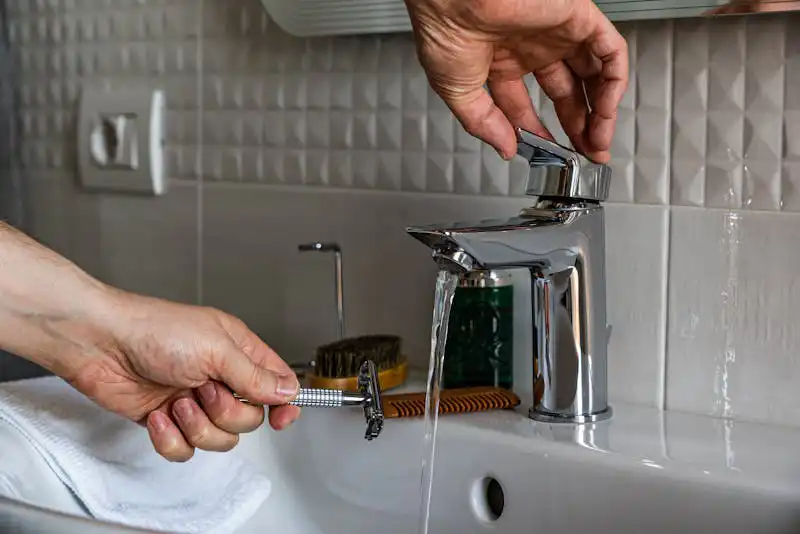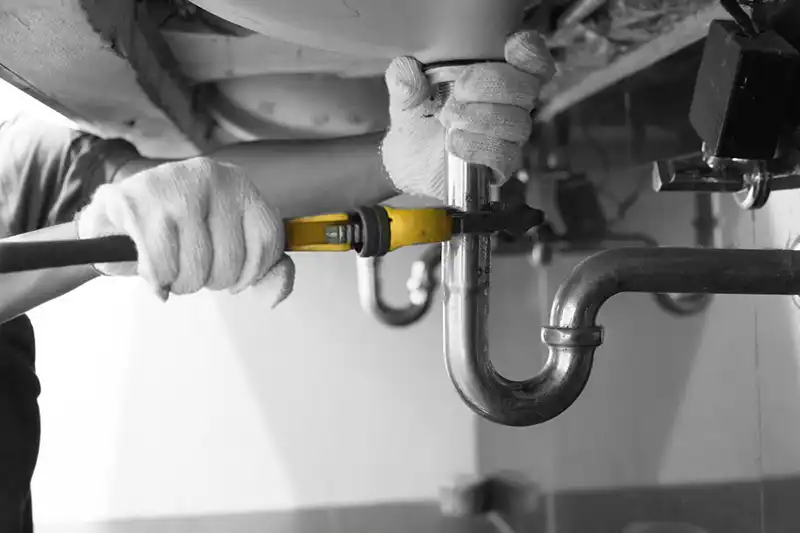Plumbing issues are a fact of life, especially in Southeast Texas where the weather and local conditions can put unique strains on our home plumbing systems. At Spindletop Plumbing in Southeast Texas, we understand the concerns and questions that homeowners often have. That’s why we’ve compiled and answered the top 10 plumbing questions to help you keep your home’s plumbing in top shape.
- How Do I Prevent My Pipes from Freezing?
In Southeast Texas, while freezing temperatures aren’t as common, when they do occur, they can cause significant damage. To prevent your pipes from freezing, it’s crucial to insulate pipes in vulnerable areas such as attics, crawl spaces, and outside walls. Additionally, letting faucets drip during extreme cold weather can prevent pressure buildup from ice blockages, potentially saving your pipes from bursting. In the long term, consider installing more permanent solutions like heat tape or pipe insulation. Regular inspections can also identify areas where your plumbing may be at risk during a freeze.
- What Should I Do If My Drain Is Clogged?
First, avoid chemical drain cleaners as they can damage your pipes over time. For minor clogs, a plunger or a plumber’s snake can often do the trick. If these tools don’t work, the clog may be deeper in your system and require professional attention. Preventing clogs starts with mindful habits, such as using sink strainers and not disposing of grease and food scraps down the kitchen sink. Regularly cleaning your drains with baking soda and vinegar can also help maintain clear pipes.
- Why Is My Water Pressure Low?
Low water pressure can stem from several issues, ranging from clogged aerators on faucets to more complex problems like leaks or corroded plumbing. Begin by cleaning faucet aerators and showerheads to remove any sediment buildup. If this doesn’t solve the problem, it’s time to call a professional. Plumbers can diagnose whether the issue is with the fixture itself, your home’s plumbing, or a broader issue with your municipal water supply.
- How Often Should I Have My Plumbing Inspected?
We recommend having your plumbing system inspected at least once every two years. However, older homes or homes with a history of plumbing problems may require more frequent inspections. Regular inspections can identify potential issues before they become major problems, saving you time, money, and inconvenience.
- Can I Fix a Leaky Faucet Myself?
Yes, in many cases, you can. Leaky faucets are often caused by worn-out washers or gaskets, which can be replaced with a few tools and a bit of DIY know-how. However, if after replacing these parts the leak persists, the issue may be more complex. In that case, it’s best to call a professional plumber to avoid causing further damage.
- What Are the Signs of a Hidden Water Leak?
Signs of a hidden water leak include unexpectedly high water bills, the sound of running water when all taps are off, damp floors or walls, and the growth of mold or mildew in unusual places. If you notice any of these signs, contact a plumber immediately. Hidden leaks can cause significant damage if left unaddressed.
- How Can I Improve My Home’s Water Quality?
Improving your home’s water quality starts with identifying the specific problems, such as hardness, high mineral content, or contaminants. Based on the issues, solutions can range from installing water softeners to using under-sink or whole-house filtration systems. Regularly replacing filters and maintenance is crucial for keeping these systems effective.
- What Should I Do If My Toilet Won’t Stop Running?
A constantly running toilet can waste a significant amount of water. This issue is usually caused by a problem with the flapper valve not sealing correctly. Adjusting or replacing the flapper and ensuring the fill tube is properly positioned are fixes most homeowners can do on their own. If these steps don’t work, the issue might be with the fill valve, which might require professional help.
- Is It Safe to Use Drop-In Toilet Bowl Cleaners?
While drop-in toilet bowl cleaners can keep your toilet smelling fresh and looking clean, they may harm the internal components of your toilet tank over time, leading to leaks and other problems. For long-term maintenance, it’s better to use manual cleaning methods. If you prefer the convenience of drop-ins, opt for a septic-safe, non-chemical alternative.
- When Should I Call a Professional Plumber?
While many minor plumbing issues can be addressed with DIY methods, there are times when calling a professional is the best choice. Situations requiring a plumber include persistent clogs that home remedies can’t fix, installation of new pipes or appliances, any work involving gas lines, and significant leaks or water damage. When in doubt, it’s always safer to consult with a professional to prevent potential damage or more complex issues.
- How Can I Tell if I Need a Water Heater Replacement?
Signs that you might need a new water heater include age (most last 10-15 years), rust-colored water, rumbling noises, leaks, or a sudden lack of hot water. If you’re experiencing any of these issues, it’s important to consult a professional plumber. Sometimes, the problem might be repairable, such as replacing a heating element or the pressure relief valve. However, if the tank is leaking or the system is old, replacement is often the most cost-effective solution.
- What Is the Best Way to Maintain My Septic System?
To maintain your septic system, have it inspected and pumped by a professional every 3-5 years, depending on usage. Be mindful of what you flush down your toilets and drains; avoid disposing of non-biodegradable items, chemicals, and excessive amounts of cooking oils and fats. Also, conserve water to reduce the amount of wastewater that your septic system must treat. Regular maintenance and care can extend the life of your septic system significantly.
- Why Do I Hear Gurgling Sounds from My Drains?
Gurgling sounds from your drains or toilets can indicate a blockage in the vent pipe or a partially clogged drain. The gurgling is caused by air being trapped and then released. If not addressed, it could lead to slower drains and eventually complete blockages. Vent pipes might need to be cleared of obstructions such as leaves or bird nests, and drains might require snaking to remove clogs.
- Is It Worth Investing in a Tankless Water Heater?
Tankless water heaters, while more expensive upfront, offer numerous benefits including endless hot water, lower energy bills, more space savings, and a longer lifespan compared to traditional tank heaters. They’re ideal for families who use a lot of hot water or for homes where space is at a premium. However, the initial cost and potential need for retrofitting your plumbing or electrical system can be drawbacks. Assessing your household’s hot water needs with a professional can help determine if a tankless system is right for you.
- How Do I Deal with Hard Water Issues?
Hard water can cause scaling, which damages appliances, clogs pipes, and makes soap less effective. Installing a water softener system is the most effective way to deal with hard water. These systems remove minerals like calcium and magnesium, which cause water hardness. For a less comprehensive approach, consider a showerhead filter to protect your skin and hair or a dishwasher salt to combat scale buildup on dishes.
- What Is a Sump Pump, and Do I Need One?
A sump pump is a device installed in the lowest part of a basement or crawlspace. Its job is to keep the area under the building dry and to prevent it from flooding. Typically, sump pumps are necessary in areas prone to flooding or where the water table is above the foundation of a home. They can also be beneficial in any home as a precautionary measure against severe weather conditions or sudden leaks.
- How Do I Choose the Right Plumber?
Choosing the right plumber involves checking for licensure, insurance, experience, and reputation. Ask for recommendations from friends or family, read online reviews, and request estimates from multiple plumbers before making a decision. It’s also important to ensure that the plumber you choose specializes in the services you need.
- Can I Install New Fixtures Myself?
Installing new fixtures like faucets, showerheads, or toilets can be a DIY project if you have the right tools and some basic plumbing knowledge. However, for more complex installations that involve altering plumbing lines or extensive renovations, hiring a professional is advisable to ensure everything is up to code and installed correctly.
- What’s the Difference Between Soft Water and Hard Water?
The difference between soft water and hard water is the concentration of minerals. Hard water contains high levels of minerals like calcium and magnesium, which can lead to buildup in pipes and appliances, while soft water has these minerals removed. Soft water is gentler on appliances, easier on soap and detergents, and better for skin and hair.
- How Can I Save Water and Lower My Utility Bills?
Saving water and lowering utility bills can be achieved by fixing leaks promptly, installing low-flow fixtures and appliances, using a dishwasher instead of hand-washing dishes, and turning off the tap while brushing teeth or shaving. Additionally, consider investing in a smart water meter or a rainwater harvesting system for garden use. Simple changes in daily habits, along with some strategic upgrades, can lead to significant savings.
By addressing these questions, homeowners in Southeast Texas can better understand their plumbing systems and make informed decisions about maintenance, repairs, and upgrades. Spindletop Plumbing is always here to help with expert advice, installation, and repair services to ensure your home’s plumbing system is efficient, reliable, and well-maintained.
Top Residential Plumbers in Southeast Texas
At Spindletop Plumbing in Southeast Texas, we’re here to ensure your plumbing needs are met with expert care and advice. Whether it’s a routine check-up, an emergency repair, or answering your plumbing questions, our team of professionals is ready to help. Remember, preventative maintenance is key to avoiding plumbing disasters, so don’t hesitate to reach out for your plumbing inspections and queries.
Spindletop Plumbing
409-748-5186
https://facebook.com/spindletopfixit/
Google Business Listing



